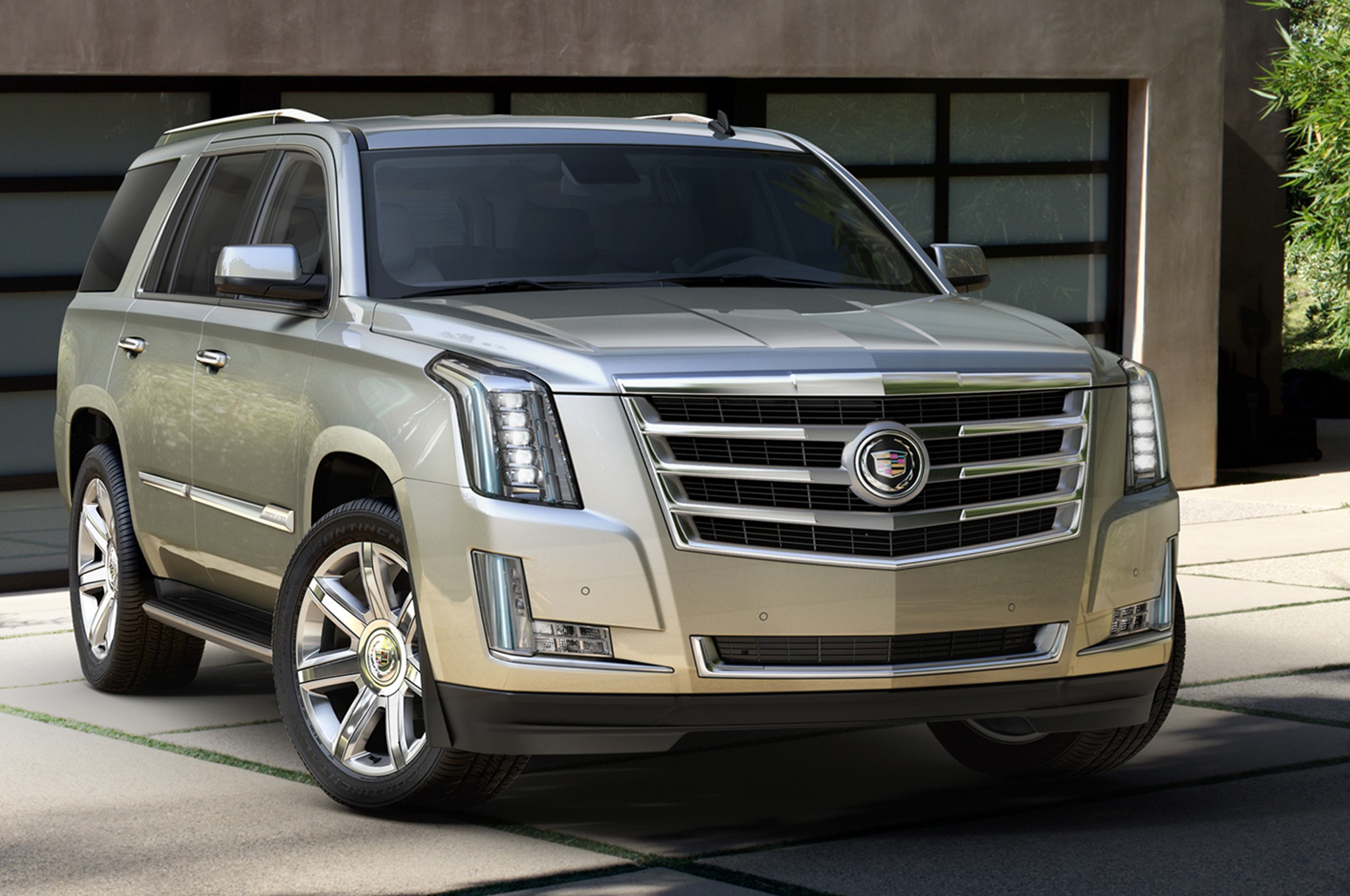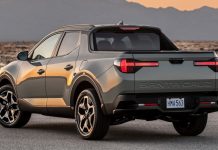In its Mad Men-era heyday, a Cadillac was the ultimate, the most, over-the-top… and not the least bit shy about it. Big fins – and big V8s.
Even bigger attitude.
Here’s to repeating history.
WHAT IT IS
The Escalade is the end product of giving Cadillac designers a Chevy Tahoe and a blank check. The Tahoe’s still in there – somewhere – but you’ll never see it without peeling away layers of leather and velour, unbolting all that Cadillac-specific sheetmetal.
Well, you might pop the hood.
But then you’ll find a kinship with the Corvette – in the form of the 420 hp 6.2 liter V8 that powers the Escalade. And which outpowers every single would-be rival.
Base price for the RWD Escalade is $72,970. Add 4WD and the price ticks up to $75,570. Luxury, Premium and Platinum trim packages are available from there, with the latter topping out at $91,875 for a 4WD version.
In comparison, the Lincoln Navigator is a super-sized blue light special. Its base price is just $61,480 – and you can buy the “L” stretch version for $67,220. But the once-proud Navigator (which beat the Escalade to market back in the ’90s and actually sold better for several years) no longer even offers a V8 engine and no matter how many turbos Ford (er, Lincoln) bolts to it, a V6 will never be a V8.
Sorry, Charlie.
Probably the most direct-comparison cross-shop – at least in terms of shock and awe value – is probably the Infiniti QX80. However it comes in one size only (in between the Escalade and Escalade ESV) and while it’s at least got a V8, it isn’t a 420 hp V8.
You might also consider the Lexus LX570 – but it’s getting long in the tooth (current model, same as last year’s model) is a smaller vehicle, can’t pull as much – and has a much weaker engine.
Plus, it costs more than the Caddy – $83,540 to start.
After last year’s complete overhaul, the ’16 Escalade receives a number of upgrades to its suite of standard and available electronic equipment, including Lane Keep Assist and service prompts sent to the owner via smartphone text or e-mail (Advanced Diagnostics). The CUE touchscreen interface in the center stack also has a faster processor for better performance (including faster map loading for the GPS) and the various driver-selectable appearance options for the main gauge cluster have been slightly reshuffled.
WHAT’S GOOD
Elvisian styling.
The heartbeat of a Corvette.
The most – of everything.
WHAT’S NOT SO GOOD
22 inch wheels (standard on Luxury and up trims) don’t exactly deliver a luxurious ride.
4WD system lacks two-speed transfer case and Low range gearing.
V6 Navigator can pull more than V8 Cadillac.
All Escalades come standard with V8 power.
A big V8.
6.2 liters.
Sourced from the Corvette, the Escalade’s V8 makes an incredible 420 hp and 460 ft.-lbs. of torque. Put that engine in something that weighed a couple thousand pounds less (like a Corvette) and you’d have a supercar. Tasked with pulling what amounts to two Corvettes, the 6.2 V8 manages to deliver supertruck acceleration: Zero to 60 in about 5.8 seconds for the RWD Escalade; a few tenths more for slightly heavier 4WD versions.
To get a handle on that, ponder the fact that the Escalade – six thousand pounds or so, as tall as an NBA forward (well, almost) and with the aerodynamic slipperyness of a pinball machine on roller skates – is only about 1 second or so off the 0-60 pace of a new Camaro SS.
And the Camaro can’t pull 8,100 pounds – much less carry seven people along for the ride.
The 6.2 V8 is paired with a new eight-speed automatic (vs. the previous six-speed automatic) which together deliver mileage stats almost as miraculous as the 0-60 stats: 15 city, 21 highway for the rear-drive version and 14 city, 21 highway for the 4WD-equipped version.
To get a handle on that, my old muscle car – a ’76 Pontiac Trans-Am – which has a big V8 but nowhere near 420 hp – gets maybe 10 MPG.
And it does not have 4WD.
The Infiniti QX80’s standard V8 displaces a comparatively small-fry 5.6 liters. And the poor old Navigator – actually, the poor new Navigator – comes standard with a V6 that’s only about half the size (3.5 liters) of the Caddy’s V8 and which makes a comparatively puny 380 hp.
However, the Lincoln does have a higher maximum tow rating (9,000 lbs.) which may be a function of its turbo’d V6 producing its max torque – the same 460 ft.-lbs. as the Caddy – sooner. The EcoBoosted Lincoln’s peak occurs at just 2,500 RPM vs. 4,100 RPM for the Escalade’s V8.
The Caddy’s system does not have a two-speed transfer case or 4WD Low range gearing. That plus those 22-inch rims and short sidewall sport tires are not the ticket for snow-day driving.
Think twice about wet grass, too.
The Lincoln Navigator’s optional “4WD” system is similarly light-duty, with no Low range gearing.
If you need off-road capability, check the Infiniti QX. As of this writing in mid-summer 2015, it is the only super-sized SUV you can still buy that has a 4WD system with a two-speed transfer case and Low range gearing.
ON THE ROAD
The Escalade is kind of like Mr. T in Rocky III. Mean and surly. Eye of the tiger.
Its Corvette-sourced 6.2 liter V-8’s 460 ft.-lbs. of torque (and 420 hp) is pure delicious overkill. You could probably pull a spark plug wire, run the thing on seven cylinders – and still outrun the Navigator. And on the highway, thanks to the eight-speed automatic’s deep overdrive gearing, the revs at 75 are just over 2,000. This makes it feasible to travel almost 550 miles on 26 gallons of fuel.
That’s about as far as a Prius will go on a full tank, by the way.
I was able to truck down to Raleigh, NC from my home base in the Roanoke, VA. area – a trip of about 250 miles – without stopping for fuel on the trip down – or back. And the Escalade’s passing power at 70 is (trust me) much superior to that of the Prius.
The ride – especially Limited (and up) models with the 22 inch wheel/tire package – is stiff. Which is to be expected, because there’s just not much give or cushion available when your tires’ sidewalls are only about two inches high. These “rims” are the vehicular equivalent of holding a Glock sideways. Maybe it’s stylish – but it’s functionally pretty stupid.
Gnomesayin’?
The huge wheels also increase rolling resistance. With less obstreperous “rims,” the Escalade would be even quicker and – not that anyone cares at this price point – probably get better gas mileage, too.
The Navigator comes standard with more functionally sensible 18 inch wheels – and not surprisingly, has a much softer, more luxurious ride.
On the other hand, the low-aspect-ratio tires do give the Caddy sharper response to steering inputs. And they do a very effective job of reducing body roll to almost nil.
All the vehicles in this class are lunkers, but the Escalade doesn’t feel its size because it has a tighter turning circle (39 feet) than either the QX80 or the Navigator (41.6 and 43.9 feet, respectively). This makes it noticeably easier to maneuver in tight confines such as the car-crowded parking lot of a fast food joint. It also sits lower than either of its two competitors: 74.4 inches for the Escalade vs. 78.1 for the Lincoln and 75.8 for the Infiniti. This makes it less awkward to deal with drive-throughs (as at banks) and low-ceilinged parking garages. No doubt, the Escalade’s lower-in-the-weeds stance also enhances its stability at higher speeds.
It is, however, wider than its rivals: 80.5 inches vs. 78.8 for the Nav and 79.9 for the Q. This makes parking public parking spots (which are generally designed for Camry-sized cars) seem all the smaller.
I like the new capless fuel filler system. It’s convenient – and much less messy, an important consideration when considering a premium vehicle. You will not have to worry about griming up your hands on the gas cap, because there is no gas cap. Just push the fuel pump’s nozzle in the hole.
The pump, however, is not under Cadillac’s control.
The main gauge cluster is driver-configurable and now entirely flat-screen. This is the trend in high-end cars, for two main reasons. First, it looks slick. We live in an iPad Age and old-style analog gauges look so… 1990s. Second, they’re configurable. More information can be displayed – called up at will by scrolling through the various menus. With fixed-in-situ analog gauges, you can only fit so many gauges (and so much information) in the limited space available.
The flat-screen theme continues to the right of the main gauge cluster, where there is a secondary eight-inch LCD via which you access/operate the audio system, GPS and various apps. Cadillac styles this the CUE – Cadillac User Interface. If you like iPads, you will like the CUE. It works pretty much the same way. It has text-to-voice and Siri Eyes Free capability, too.
Below this are the controls for the AC/heater. They are not flat screen. They are “haptic” – GM’s term for finger-swipe (and tap) control inputs. My only beef with it is that sometimes you get too much (or not enough) of what you want, such as more or less fan – because it’s fairly easy to swipe too far (or not far enough), especially with the vehicle in motion.
AT THE CURB
The Escalade is big – but it’s not the biggest.
Not the standard model, anyhow.
At 203.9 inches long, end to end, it is 4.4 inches shorter than the Infiniti QX (208.3 inches) and 4.5 inches shorter than the standard-sized Lincoln Navigator (208.4 inches).
This might just be “just right” sized – big, but not too big. I can vouch for the Q being a bus. A nice bus.
But a bus.
It’s a handful.
The Escalade is big – but manageable. See points made earlier about turning circle, ride height and steering response.
And if you do want more metal – even more than the Q – there’s the Escalade ESV. It’s almost two feet longer than the regular Escalade. That’s also longer (by about an inch) than the Lincoln Navigator “L,” too. (And don’t forget: The regular length Lincoln is underpowered; imagine how much more underpowered the longer – and heavier – “L” version is.)
Packaging in the Caddy is also better. You get 45.3 inches of front seat legroom – by far the most in this class (the Navigator has 41.1 inches; the QX80 just 39.6 inches) and plenty of room in the second row: 39 inches for the Caddy, 39.1 for the Nav. The Q has more – 41 inches – but remember the front seat spec.
The Caddy also has much more headroom than its rivals: an NBA forward-friendly 42.8 inches – vs. 39.5 in the Lincoln and 39.9 in the Infiniti.
The third rows in all these rollers are compromised because they sit on top of the rear axle, which means the floorpans have to be higher in the third row than in the second row. This is the chief deficit of the RWD-based layout (and why FWD-based crossover SUVs are more space-efficient inside). But, though you sit with your legs tucked up a bit, there is decent legroom – and the third row is thus usable by most adults and absolutely fine for young kids and teens.
The Escalade’s second and third rows also fold flat – and at the touch of a button. This creates a total of 94.2 cubic feet of space – enough to easily cart home a full-size outdoor gas grille with accessories. I know it can, because I did exactly that with my test Caddy.
Per the Mad Men meme, Cadillac has been dialing up some classic-era Cadillac themes (no, not fake convertible tops and opera lights on the C pillars). These include very tall – and very thin – taillights whose shape evokes the classic look of Caddys from the late ’50s and early ’60s. Up front, a massive chrome grille is set off on either side by inverted L-shaped headlights with five stacked individual LED projector bulbs.
If they ever reboot Mad Men – fast-forward it to our time – this is what a latter-day Don Draper would be driving.
You can order everything imaginable – just about – that might be on a just-signed first-round draft pick’s wish list, including Blu-ray player and power retracting steps with puddle lighting.
But even the “base” model comes with a heated steering wheel (and heated seats), three-zone climate control, power adjustable pedals, Bose 16-speaker audio, five USB ports and a driver-adjustable, magnetic ride controlled suspension. My tested Platinum trimmed Escalade featured massaging front seats, “semi-aniline Nappa Leather,” electrically chilled cupholders and a chilled cooler box in the center console. Plus twin Blue-Ray DVD players for the second row.
WiFi “hot spot” take-it-with-you Internet access is also on the menu – and (for 2016) the Escalade will send text messages or e-mail when it needs servicing.
Cadillac hasn’t caved.
It has doubled-down.
Instead of bending with the prevailing winds of political correctness and downsizing, de-powering or even outright dropping V8s from the roster, Cadillac installed a bigger and stronger V8 in the Escalade.
This is a very large part of the Escalade’s appeal. Of Cadillac’s appeal. It is not for people who are ashamed of what they make – or how much gas they use.
I dig that.
So do enough other people to keep Cadillac in the black.
Nothing else rivals the Escalade for power/performance – or testosterone overflow. Who needs Viagra when all you need to do is stand near one of these things?
THE BOTTOM LINE
Like it – or loathe it – the Escalade is the Cadillac of super-sized SUVs.
If you value independent media, please support independent media. We depend on you to keep the wheels turning!
Our donate button is here.
If you prefer to avoid PayPal, our mailing address is:
EPautos
721 Hummingbird Lane SE
Copper Hill, VA 24079
PS: EPautos stickers are free to those who sign up for a $5 or more monthly recurring donation to support EPautos, or for a one-time donation of $10 or more. (Please be sure to tell us you want a sticker – and also, provide an address, so we know where to mail the thing!)















A barge on wheels for those whose masculinity is challenged. I know several who drive them, and none of them can really afford them, but the show must go on!
Should come with a doctor’s prescription for testosterone injection.
I hear you rick… 🙂
Can’t help but think the GMC version is probably as nice. I hope that cover over the gas tank is better than most pickups. It needs to seal, completely seal cause west Tx. leaves those things full of dirt and when you push in the nozzle, yep, dirt goes in with it.
The 22’s don’t look good to me, old school me I guess but they look ridiculous and won’t do a job for those in my part of the country who regularly run down dirt or caliche roads. People don’t live on the pavement here for the most part, esp. those who can afford to not be on pavement or can either have many miles of private road paved or enough pull to get county roads paved to their gate and few give a shit about it. They just want to pound down those rough roads in a Caddy and never realize they’re rough. That tire/wheel combo won’t cut it although cut is the key word here, cut sidewalls.
And you’re right Eric, smaller wheels and larger tires would probably up the fuel mileage and performance both. It’s not uncommon to see these vehicles on lease roads and not uncommon to see them sitting there with a blown tire and some hand coming out to fix it.
It is a distinctive look and no doubt, a Caddy in all rights. Back in the day everybody who knew cars and engines knew a 454 would be the better engine in a Caddy but back then, no one would be caught dead buying a Caddy with a Chevy engine. A 455 Olds engine would have been a big improvement and idled more smoothly than the Chevy and that would have been a great engine for Cad’s but a re-badged Olds SD wouldn’t have cut it either.
Although I couldn’t afford the insurance on one, I’d drive one till the wheels fell off. And as far as towing, I never quite understood the way those ratings came about. And I never could tell much difference in the Big 3 when it came to maximum towing. But I wouldn’t be getting it for towing and very few people will. Now towing is something for diesels. If you want to tow a big travel trailer or big boat or big trailer, you’re going to get a big pickup with a diesel and it won’t be much off the luxury of this Caddy……if any.
What you really need is a long term tester and an old guy in Texas to put it through the hoops.
BTW, does it have the newer style 3″ receiver? I’ve never parted a 2″( I’ve bent the hitch part way down) but a 3″ that was made standard for GM pickups a few years ago seemed to add some insurance.
Back in the heyday, nothing Cadillac came from the Chevy parts bin. NOTHING. Impala versus de Ville were about as different as Pinto from Lincoln. Now the bling-bling-mobile from the Standard of the World is simply a Chevy wearing a fur coat. Nothing new here.
Heck there are often parts on a car from a competing automaker, since they buy from each others parts bins now too.
Even if we had true free market cars, I doubt we will ever see parts for one make only anymore. Bean counter never see the value of them, just the extra cost.
rich, I first noticed competing company parts when a friend bought an ’84 Wagoneer. It was replete with Ford window and door switches and gauges too. They worked fine the life of the vehicle, better than the Chrysler junk on them. Those were 100,000 mile vehicles. Chrysler was always stingy with nickel in their engine castings and while they would make decent power(the 360’s in the Wagoneers did NOT)they never lasted. The shame was the rest of the vehicle was stout as hell. The Torqueflite’s were so so. It was their execution of making the 4WD systems work reliably that sucked. Electric over vacuum is a disaster for that type of vehicle. You were lucky if you knew the parts on the outside you could manipulate(if you wanted to crawl under one)to engage and disengage that really great Selectrac system. They’d climb a tree and run almost their top speed in the snow and ice. Just a bit more reliability and they’d be much more common now.
Ford used to stamp bodies for Mopars at the Rouge. The Dodge Brothers built transmissions and rear axles for Model T Fords. Chevy supplied drivelines for Checker cabs. Delco-Remy and Autolite electricals were used by the independents and industrial and agricultural manufacturing companies. Lincoln had the GM Hydramatic for several years while AMC used the Chrysler Torqueflite for decades. They’ve been in bed with each other for all automotive history, relying on the excess manufacturing capacities of each other for cost savings.
Even newer than that, GM and Chrysler used the same New Venture Gear 4500 transmission in the diesel pickups of the 90’s with GM having no synchro and Dodge having one in reverse. They both used the same 10.5″, 14 bolt cover rear-end in them too. They may still use that rear-end although there are no manual diesel pickups now. I have a John Deere 4020 with the same distributor used on GM six cylinders. I used to faithfully use Autolite plugs in a Chevy even though they were mainly Ford plugs but looked identical to Delco-Remy except they seemed to hold up better and seemed to have more difference in their heat ranges although that could just be my impression.
The only thing GM never shared I know of was their far superior u-joints and CV joints. And nobody wanted Ford to share their manual trannies from the 50’s and 60’s, even 70’s. The first Wagoneers had GM SBC 400’s and TH 400’s…..and those were the best they ever made.
I’ve seen lots of engines and realize they had Delco-Remy distributors and electrical parts.
And if their styling engineers didn’t trade notes every year I’ll be the monkey’s uncle. Think about it. Upscale big 3 in ’59 for example with big vertical fins and the lower priced cars with horizontal fins. They couldn’t decide on the Buick so it had some funky sides and rear, probably a better look that most everything else. ’61 comes along and voila, no fins, just a front to rear thing that went down at an angle and straight on top. It was Coke or Pepsi or DP unless you wanted the off-beat and then it was RC Cola(Buick) that really wasn’t so different after all when you look back on them.
Well,I’d never buy one, even if I were shopping in the luxo/sumo SUV niche.
Still, it’s nice to see that Caddy can still build something that is popular, and more than competitive in it’s segment. Most of their other current products are pathetic back markers in their respective categories.
Got to love the irony of the way the old spirit of Cadillac lives on, in a vehicle that isn’t even a car but a truck.
It’s the result of nearly 40 years of the stupidity of CAFE. Our rulers wanted our large cars, but some will always look for the loopholes, and the SUV was it. The next generation will have to look far harder for those loopholes, but they will be there, government types aren’t that smart.
Does GM hand build all the 6.2 liter V-8’s? Or just the ones that make their way into Corvettes?
Just the Corvette and Cadillac derivative at Bowling Green. You can pay extra to “help” build one for your very own Vette.
Those taillights are unbelievable. They’re super-bright, even during the day.
Another feature from the back of it – see the rear wiper? No? It’s tucked up under the spoiler. Now the rear glass is clear & wide-open, and looks much better.